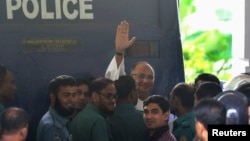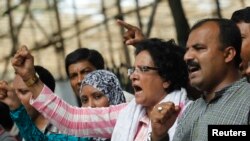NEW DELHI —
A war crimes tribunal in Bangladesh has handed the death penalty to a senior member and lawmaker from the main opposition party for his role in the country’s 1971 war of independence. It is the seventh verdict announced against opposition leaders by the controversial court and has raised fears of more political violence in the country.
Security was tight in the packed Dhaka courtroom where Bangladesh Nationalist party leader Salahuddin Quader Chowdhury was handed the death penalty for genocide, abduction and torture, among other charges.
He is the first sitting member of parliament and the first leader of the main opposition BNP to be sentenced in connection with the mass killings and other crimes that took place in 1971, when the country broke free of Pakistan after a bloody struggle.
After the sentence was read out, Chowdhury accused the government of orchestrating the verdict, saying “it came from the Law Ministry. It has been available on the Internet since yesterday.”
Ataur Rahman, a political professor at Dhaka University, said the 64-year-old Chowdhury is an influential leader from a well connected political family. “He has been a member of parliament for 37 years. He is popular and powerful, and popularity and power in Bangladesh go hand in hand.”
Troops deployed
Fearing violence, the government deployed troops in Chittagong, Chowdhury’s home district.
The government opened the inquiry against nine senior opposition leaders nearly 40 years after the country’s independence struggle, during which some local leaders were accused of collaborating with Pakistani forces. Seven are Islamists from the Jamaat-e-Islami. Two are from the BNP.
Both parties denounce the trials as politically motivated and say they are an effort to decimate the opposition. The trials have triggered violent street protests since the tribunal began handing down the verdicts earlier this year. At least 100 people have been killed.
Analysts say the trials have deepened divisions in a country which is deeply politically polarized. They say both the BNP and the Jamaat-e -Islami are likely to join hands to create a new momentum against the government, which has to hold elections by January next year.
Political commentator Rahman said there also is a measure of public opposition to the trials. “Even the saner elements within the society think that this should be as [a] symbolic verdict. This capital punishment inspire a lot of negativity and also people are thinking that the government is trying to reap the political dividend out of this whole process of trial.”
The government says the trials will heal the wounds of the 1971 war. Human rights groups say the war crimes tribunal does not meet international standards.
Security was tight in the packed Dhaka courtroom where Bangladesh Nationalist party leader Salahuddin Quader Chowdhury was handed the death penalty for genocide, abduction and torture, among other charges.
He is the first sitting member of parliament and the first leader of the main opposition BNP to be sentenced in connection with the mass killings and other crimes that took place in 1971, when the country broke free of Pakistan after a bloody struggle.
After the sentence was read out, Chowdhury accused the government of orchestrating the verdict, saying “it came from the Law Ministry. It has been available on the Internet since yesterday.”
Ataur Rahman, a political professor at Dhaka University, said the 64-year-old Chowdhury is an influential leader from a well connected political family. “He has been a member of parliament for 37 years. He is popular and powerful, and popularity and power in Bangladesh go hand in hand.”
Troops deployed
Fearing violence, the government deployed troops in Chittagong, Chowdhury’s home district.
The government opened the inquiry against nine senior opposition leaders nearly 40 years after the country’s independence struggle, during which some local leaders were accused of collaborating with Pakistani forces. Seven are Islamists from the Jamaat-e-Islami. Two are from the BNP.
Both parties denounce the trials as politically motivated and say they are an effort to decimate the opposition. The trials have triggered violent street protests since the tribunal began handing down the verdicts earlier this year. At least 100 people have been killed.
Analysts say the trials have deepened divisions in a country which is deeply politically polarized. They say both the BNP and the Jamaat-e -Islami are likely to join hands to create a new momentum against the government, which has to hold elections by January next year.
Political commentator Rahman said there also is a measure of public opposition to the trials. “Even the saner elements within the society think that this should be as [a] symbolic verdict. This capital punishment inspire a lot of negativity and also people are thinking that the government is trying to reap the political dividend out of this whole process of trial.”
The government says the trials will heal the wounds of the 1971 war. Human rights groups say the war crimes tribunal does not meet international standards.





